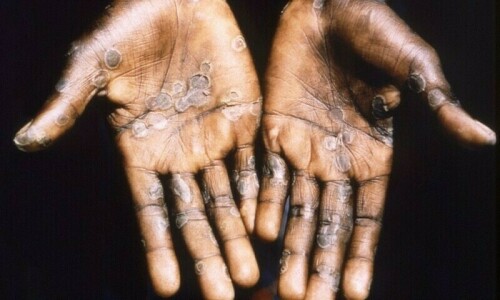PESHAWAR: The Khyber Pakhtunkhwa health department has put hospitals and other health centres in the province on alert after the reporting of the first case of mpox (previously known as monkeypox), according to a senior official.
Director (public health) at the provincial directorate-general health services Dr Irshad Ali Roghani told Dawn that the zoonotic infection was detected in a 40-year-old male resident of Mardan district by the National Institute of Health last week, while the case was “re-confirmed” by the Public Health Reference Laboratory of the Khyber Medical University, Peshawar.
He added that it was the fifth mpox case reported in the country.
“We [health department] have strengthened the surveillance network and screened 38 people among close contacts of the infected person for symptoms,” he said.
Official says condition of patient improving
The director said blood samples were collected from 11 suspected people and checked at the PHRL but they all tested negative for the disease.
He said the patient who travelled to Saudi Arabia in the past and had been discharged from the hospital was isolated in his house in his native town.
“There is no cause of concern as the condition of the patient is improving,” he said.
Dr Roghani said the doctors had prescribed 14-days antiretroviral therapy for the patient and since the drug wasn’t available in the country, the health department had requested the World Health Organisation’s Islamabad office for its supply.
He said he had written to WHO country chief Dr Palitha Mahipala seeking the provision of 5-10 additional doses of mpox medicine to respond to future cases of the disease.
“We have directed the district health authorities to constantly monitor the patient’s condition, while all health centres in the province, including hospitals, have been told to ensure the screening and testing of suspected people in a timely manner,” he said.
The official said the health department had also formally sought the consent of the Drug Regulatory Authority Pakistan for the import of that drug from the United States.
Meanwhile, Prof Khalid Mahmood, a former physician at the public sector Lady Reading Hospital, Peshawar, told Dawn that mpox was a viral illness.
“Mpox is endemic to western and central Africa, where it causes sporadic outbreaks due to contact with infected animals. Its first case in humans was reported in the Democratic Republic of Congo. As of Sept 2023, its 90,618 cases with 157 deaths have been reported worldwide,” he said.
The expert said since May 2022, a global outbreak of mpox had been reported outside its traditionally restricted endemic African regions and that the WHO had declared it “an evolving threat of moderate public health concern” in June last year.
“This disease is transmitted via respiratory droplets, prolonged close or direct contact with cutaneous lesions, and perhaps through contaminated fomites,” he said.
Prof Khalid said that mpox could be prevented primarily by avoiding direct contact with infected animals and patients, the use of face masks, and adherence to precautionary measures.
He said immunisation of the population at risk and those likely to be exposed to the infected patients or animals was also recommended.
The doctor said the management is mainly supportive and symptomatic.
“Antiviral drugs are undergoing trials and may become available in future,” he said.
Published in Dawn, October 29th, 2023














































Dear visitor, the comments section is undergoing an overhaul and will return soon.